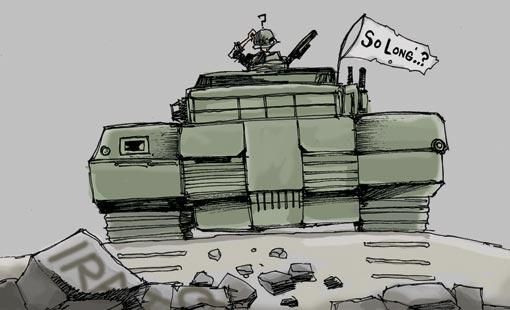In an anti-climactic moment, General David H. Petraeus, the senior commander of multinational forces in Iraq, recommended last Tuesday a suspension of American troop withdrawals until after July 2008. His principal argument rested on ostensible gains recorded in recent months, which could be jeopardised, he affirmed, if Washington were to remove "too many troops too quickly".
Coincidentally, and on that same day, the London Guardian revealed that a draft strategic agreement between Washington and Baghdad intended to substitute the existing United Nations mandate with a more robust, even if temporary, American presence in the hapless country. While the accord did not envisage "permanent bases or a permanent military presence in Iraq", it nevertheless identified long-term intentions.
As this column posited in the past, the United States will probably have combat forces deployed in Iraq for the foreseeable future, barring dramatic political shifts in the November 2008 American presidential elections. Therefore, what is one to make of the latest Petraeus show on Capitol Hill, and will this enhance regional security?
Petraeus' assessments drew sharp criticisms from the chairman of the Armed Services Committee Senator Carl Levin who insisted that the Bush administration had adopted "a war plan with no exit strategy". He was not persuaded of any alleged gains in either the security or political arenas as recent events in and around Basra highlighted.
In response, Petraeus insisted that Iran were to blame for these setbacks, which were allegedly organised by radicalised groups supported from Tehran, although he and Ambassador Ryan C. Crocker recommended a short period of "consolidation and evaluation."
This logic aimed to destroy Al Qaida in Iraq though Levin asked the key question: How come the five additional combat brigades dispatched last year, under the so-called surge, failed to achieve that goal? Why should anyone extend further assistance to a government, which has shown "incompetence" and adopted "excessive sectarian" policies, he insisted.
Levin's passionate argument was retorted by Senator John McCain, the presumptive Republican Party presidential nominee, who insisted that any talk of withdrawal was "reckless and irresponsible," perhaps even a model of "moral and political leadership", fiasco.
To be sure, McCain acknowledged that past American mismanagement was responsible for current conditions, but the surge allegedly improved the security environment and created "a new opportunity". There was "real hope and optimism about the future", he concluded.
Remarkably, he asked about the lesson that over a thousand Iraqi army and police personnel deserted, but answered his own question with a reluctant "suffice it to say, it was a disappointment", not realising that one should not be surprised when soldiers do not shoot their own relatives.
The two Democratic Party contenders, senators Hillary Rodham Clinton and Barack Obama, duelled with Petraeus though with less passion than expected.
Clinton declared that it was "time to begin an orderly process of withdrawing troops", because emphasis on Iraq essentially meant lost opportunities in Afghanistan as well as on the broader war against terrorism.
Original decision
For his part, Obama rejected the Petraeus call, insisting that he "believed the original decision to go into Iraq was a massive strategic blunder", and that Washington is now in a "messy, sloppy status quo".
He recognised that the 2007 troop increases had "reduced violence" but that the Iraqi government failed to take advantage of these new conditions, to resolve sectarian differences.
Obama insisted that the way to promote a resolution was by "applying increased pressure in a measured way", which should include a timetable for an orderly withdrawal.
Interestingly, many questions linked future deployments with anticipated financial assistance, which effectively meant that Iraq would be asked to pay for the American presence.
"The era of US-funded major infrastructure projects is over", Ambassador Crocker announced, which was certainly tied to the leaked memo from the Guardian. Crocker explained how the new "strategic framework" aimed t
o cement official ties, define "basic authorisations and protections" for American forces, and provide "a stable foundation" for the next president.
The key point here is that American combat operations could easily drag on for decades. Beyond breaking the military, such a commitment will probably bankrupt the country, hence the search for alternative finances.
At an estimated $3 billion per week, with about 40 American and hundreds of Iraqi lives lost each month, how much longer will Washington and Baghdad agree to agree? When will they agree to disagree? And would that translate into "mission accomplished?"
As the Guardian revealed, there were no limits on actual troop numbers to remain in Iraq, nor the weapons they would deploy, both of which disguised an open-ended presence.
Still, given recent events, nothing will probably be inked anytime soon, because of the Iraqi parliament's reluctance to sign. Likewise, and with contemplated security guarantees, the "status of forces" deal would probably have to be approved by the Senate, which is not guaranteed either.
Occupying forces will eventually withdraw from Iraq but it behooves decision-makers to think about the consequences of their exit. Just as there was a legacy for invasion and occupation, there will be one for withdrawal, which will shape local perceptions for generations to come.
While it takes a very long time to gain someone's trust, one tends to make an enemy rather fast, though one prays that those left behind will only respond with words.
Dr Joseph A. Kechichian is a commentator and author of several books on Gulf affairs.












